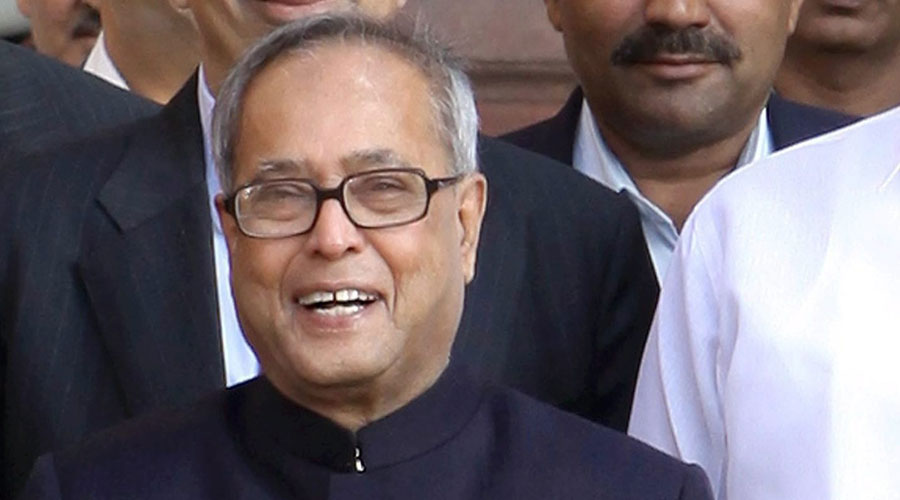Former President Pranab Mukherjee, who died on Monday in an army hospital in New Delhi, was cremated on Tuesday.
President Ram Nath Kovind, Vice President M Venkaiah Naidu and Prime Minister Narendra Modi and chiefs of three defence services were among the dignitaries who paid their last respects to him on Tuesday morning when the mortal remains of the 84-year-old leader were brought to his residence, 10, Rajaji Marg, earlier in the day.
The Union government has announced a seven-day State mourning across the country from August 31 to September 6, both days included. During the State mourning, the national flag will fly at half-mast and there will be no official entertainment.
Mukherjee's son, Abhijit, announced his death on twitter. “With a Heavy Heart, this is to inform you that my father Shri Pranab Mukherjee has just passed away in spite of the best efforts of Doctors of RR Hospital and prayers, duas and prarthanas from people throughout India! I thank all of You,” he said.
Pranab Kumar Mukherjee served as a minister in the central government for much of his political life, holding a number of portfolios; but it is with the finance ministry that one tends most commonly to associate him though he was finance minister of the country only twice, from 1982 to 1984 and again from 2009 to 2012.
This was perhaps because each of these stints was associated with an event that left an indelible imprint on public memory.
His first stint, under Indira Gandhi after she had returned to power following the collapse of the Janata Party government that had supplanted her in the post-Emergency elections, saw India approaching the International Monetary Fund for a $5.8 billion loan under the Extended Facility that had been set up in the wake of the second oil shock in 1979-80.
India had been extremely chary of borrowing from the IMF throughout the period of dirigiste economic policies, so this move was as unprecedented as it was controversial. The controversy was stoked in particular when the “conditionalities” associated with the loan, which were quite strict with rigid timeframes for fulfilling specific fiscal targets, were revealed by The Hindu newspaper through a “leak” in Washington DC.
It has remained a mystery why India went in for the loan at all, since the balance-of-payments situation did not really warrant it; this was also evident from the fact that India did not even take the full amount of the loan eventually. It would not be fair, however, to blame Pranab Mukherjee for this exercise, since he was not the moving spirit behind it and was not even in charge of the finance ministry when the loan was being negotiated, though he was when the controversy erupted.
His second stint as finance minister was marked by his effort to close the “Mauritius route”. Strange though it may seem, Mauritius was the country from which the maximum amount of foreign direct investment used to come to India.
The reason was simple: multinational companies from the advanced countries used to route their investment to India via Mauritius, because Mauritius, which hardly taxed these companies at all, had at the same time a double-taxation-avoidance treaty with India. The companies therefore got away virtually without paying any taxes, since they would claim to pay taxes in Mauritius and not in India, while hardly paying anything in Mauritius.
Pranab Mukherjee, to his credit, tried to stop this, by stipulating that whether a company could claim tax avoidance in India should be determined by whether it paid any taxes on its Indian profits in the country where its headquarters were located, rather than in Mauritius through which its investment was routed. This move, not surprisingly, caused a big uproar in corporate circles and eventually the Manmohan Singh government had to abandon the step.
The two events associated with the two stints of Pranab Mukherjee as finance minister sum up between them the nature of his stewardship of the finance ministry. Not a person of strong ideological predilections, he was more in the nature of a pragmatist within the broad policy paradigm that happened to be in place during his stint as finance minister.
If the first move we mentioned above brought forth strong opposition from the Left and Nehruvian circles, the second move aroused stiff opposition from the Right and from the neo-liberal world, especially the world of the corporate houses and multinationals.
He was neither a committed Nehruvian, struggling behind the scenes to prevent the imposition of neo-liberal economic policies on the country, as many in the Congress and the government were; nor was he a committed neo-liberal trying behind the scenes to introduce such policies before they actually got introduced. He would, however, have carried out either set of policies if given the responsibility to do so.
His stewardship of the Planning Commission as its deputy chairman in the early nineties, when neo-liberal policies were being introduced and the Planning Commission’s role was being devalued, must have confronted him with serious challenges; but he was pragmatic and accommodative enough to ride over these challenges.
His pragmatism was, however, marked by a degree of personal efficiency. In the finance ministry, dominated by techno-savvy officials and “professionals” returned from Washington DC, from the stables of the World Bank and the IMF, he commanded respect for his mastery over details, his knowledge of the intricacies of finance, and his avoidance of over-reliance on the bureaucracy.
It was typical of Pranab Mukherjee that he tried to maintain cordial relations across the political spectrum, from the Left to the Right. This sometimes earned him brickbats, but it was part of his mental make-up that contributed as much to his durability as to his success.
Prabhat Patnaik is Professor Emeritus, the Centre for Economic Studies, Jawaharlal Nehru University, New Delhi.

